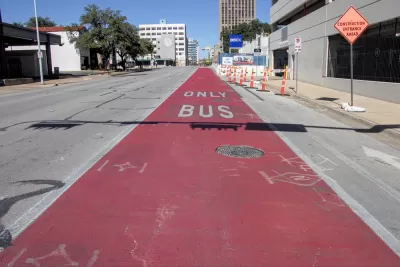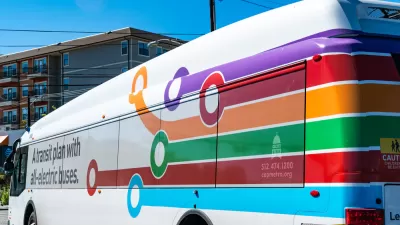A former Austin city councilmember, now at the Texas State Legislature, is trying to make it harder for Austin Transit Partnership to borrow money to fund Project Connect, the Austin region’s big, ambitious transit investment plan.

Project Connect, Austin’s plan to transform public transit in the region, is facing a new obstacle in the Texas State legislature. According to an article by Nathan Bernier for KUT, new legislation under consideration at the state legislature would limit the ability of the Austin Transit Partnership (ATP) to borrow money.
“The proposals — House Bill 3899 and Senate Bill 1791 — would force the ATP to hold a citywide election before borrowing large amounts of money to pay for the expensive upfront costs of building the light-rail system. ATP estimates it would need to borrow up to $2.5 billion and plans to repay the money with its existing stream of tax revenue,” reports Bernier.The bill was written by Republican state Rep. Ellen Troxclair, a former Austin City Council. Rep. Troxclair is quoted in the article saying the legislation will ensure transperancy for the Project Connect funding process.
The report about the new legislation comes just a few days before ATP is expected to announce proposals for scaling back the planned project scope of Project Connect, due to cost overruns associated with engineering challenges, inflation, and labor shortages. The original plan would have added two new light rail lines, four new rapid bus routes, and a new commuter rail line. Project Connect also called for expanded service on the Red Line, the city’s only existing rail transit route and add new on-demand transit capacity.
The article suggests that if passed, the legislation could cost Austin when it goes for federal funding in competitive grant processes.
FULL STORY: Texas Legislature could derail Austin's transit expansion

Planetizen Federal Action Tracker
A weekly monitor of how Trump’s orders and actions are impacting planners and planning in America.

Maui's Vacation Rental Debate Turns Ugly
Verbal attacks, misinformation campaigns and fistfights plague a high-stakes debate to convert thousands of vacation rentals into long-term housing.

Restaurant Patios Were a Pandemic Win — Why Were They so Hard to Keep?
Social distancing requirements and changes in travel patterns prompted cities to pilot new uses for street and sidewalk space. Then it got complicated.

In California Battle of Housing vs. Environment, Housing Just Won
A new state law significantly limits the power of CEQA, an environmental review law that served as a powerful tool for blocking new development.

Boulder Eliminates Parking Minimums Citywide
Officials estimate the cost of building a single underground parking space at up to $100,000.

Orange County, Florida Adopts Largest US “Sprawl Repair” Code
The ‘Orange Code’ seeks to rectify decades of sprawl-inducing, car-oriented development.
Urban Design for Planners 1: Software Tools
This six-course series explores essential urban design concepts using open source software and equips planners with the tools they need to participate fully in the urban design process.
Planning for Universal Design
Learn the tools for implementing Universal Design in planning regulations.
Heyer Gruel & Associates PA
JM Goldson LLC
Custer County Colorado
City of Camden Redevelopment Agency
City of Astoria
Transportation Research & Education Center (TREC) at Portland State University
Jefferson Parish Government
Camden Redevelopment Agency
City of Claremont



























